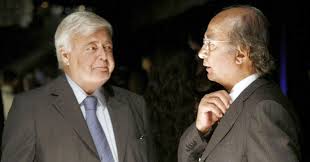By Ricardo Setyon
August 7 – They were best of friends but they have become the worst of enemies. Known in Brazil as ‘O Gordo e o Magro’, (the fat and the slim), former FIFA vice president and CBF chief Ricardo Teixeira (pictured left), and Traffic principal José Hawilla (right) have fallen out, and spectacularly so.
As the two seemingly followed intertwined paths to the top of world football – Texeira in football politics and Hawilla in sports marketing – so their fall from the top of the pile has been simultaneous and intertwined.
When Hawilla left a job as a football reporter to fund a sport marketing company called Traffic, it was Ricardo Teixeira who gave him his first contract: advertising boards at the friendly games of Brazil’s national team.
Teixeira’s rise through football’s political ranks was fast, helped in no small way when he married FIFA president João Havelange’s daughter.
Tens of millions of dollars exchanged hands between those two, ranging from the impressive Nike deal for the Brazilian team, intermediated by Hawilla, and reaching into the very profitable world of TV rights in Brazil, and all over South America.
Hawilla built an empire of businesses, ranging from TV stations, daily newspapers, player management and even football teams in Portugal, Brazil and the USA. Teixeira reached the executive committee of FIFA, and became the most powerful man in South American football.
But by the end of 2011 the opulent worlds of both men were falling apart.
Hawilla vanished from the football scene becoming persona non grata at CONMEBOL (the South American confederation) and excluded from all TV deals around the Copa America, while his football teams and player businesses started to wane.
Teixeira left Brazil in the middle of the night, in March 2012. Hiding in a luxury condo, in Boca Raton, Florida, he disappeared off the radar with no explanations as to why or how.
Both were on a list of suspects and accusations being investigated by American, Brazilian and European police forces and both names seemed to be cropping up together.
Teixeira and Hawilla have returned to the headlines recently.
Hawilla is central to the US Department of Justice’s current investigations and has agreed to pay a massive $151 million to US authorities in order to stay in limited freedom, and allow his lawyers to negotiate a smaller punishment to the possible 20 years in jail the American justice could deliver him.
Hawilla is also understood to be the main informant that led the FBI and Swiss authorities to the May 27 arrests in Zurich of the ‘FIFA Seven’. This was recently confirmed by relatives of José Maria Marin, the ex-president of the Brazilian FA, one of the seven arrested – and they want revenge.
In the meantime Teixeira, fighting a serious kidney disease, has
left Boca Raton and is now secluded in his luxury house in the Rio de Janeiro outskirts.
Brazil’s local authorities, with footballer turned politician Romario in the vanguard, are investigating his wealth and financial activities. Sources report that the American authorities have offered a plea bargain to Teixeira to become an informant (similar to Hawilla), but trouble at home is more worrying for him.
A few days ago Teixeira broke his silence for the very first time saying: “Hawilla lied bluntly to the American authorities! Accusing me of dirty deals, but there is no money or any proof of that….He is doing that because pure and simple revenge!”
That “revenge”, Texeira says, is because “Hawilla was excluded from all deals related to the Copa America, the Copa do Brasil, and also part of the World Cup qualifying games in South America”.
That exclusion started to take place, partially, in February 2011, when CONMEBOL started to question the low payments TRAFFIC were giving for the rights of the Copa America that same year – about $18 million.
“Suddenly, Traffic increased the payment from 18 million to 40 million dollars! The CONMEBOL officials understood that such increase meant that Traffic were making huge profits. And that meant, clearly, that Traffic were earning tens of millions, exorbitant benefits, with the Copa America rights. And only when they were about to lose those rights, they suddenly could pay more than double of what they used to pay…,” explains Teixeira.
Traffic could no longer do business with CONMEBOL, and were substituted by a Uruguayan company, Datisa, who paid $80 million, for the same Copa America rights. Datisa was formed by executives of three companies: Full Play and Torneos y Competencias (from Argentina) and, Traffic.
From his side, Hawilla cannot speak to the media, while he is under investigation.
Hawilla’s lawyer, José Luis Oliveira, reacted to Teixeira’s accusations saying: “Mr. J.Hawilla confirms that all the declarations of Mr Ricardo Teixeira do not have any link to a valid truth. They are not real and have no true basis. At the same time, I wish to make clear that Mr. Hawilla supports fully all investigations which are taking place now in the United States, and because of those investigations and legal procedures, Mr. Hawilla cannot and will not express himself publicly at this moment.”
In South America the football world is shivering in anticipation of possible further allegations from Hawilla to the US Authorities. Meanwhile Teixeira is busy trying to deal with Brazilian law.
Teixeira may not have started to speak yet, but when he does, if he does…
Contact the writer of this story at moc.l1745057611labto1745057611ofdlr1745057611owedi1745057611sni@n1745057611oytes1745057611.odra1745057611cir1745057611

